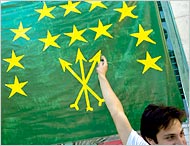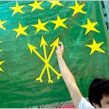
Circassians Look to Georgia for International Support
Publication: Eurasia Daily Monitor Volume: 7 Issue: 58
By:

On March 21, participants in a landmark conference “Hidden Nations, Enduring Crimes: The Circassians and the Peoples of the North Caucasus Between Past and Future” was held in Tbilisi. Participants at the conference appealed to the Georgian parliament to recognize Russian actions in the northwestern Caucasus in the nineteenth century as genocide. The conference evoked a multitude of responses from the public in the North Caucasus and in Russia proper. The Jamestown Foundation and the International School of Caucasus Studies at Ilia State University organized the event (www.kavkaz-uzel.ru, March 22).
Prior to its start, the conference already caused a nervous reaction in Russia as the Russian website War and Peace published a lengthy article, analyzing the conference. The article credited the conference with the possible impact that could potentially “lead to significant changes in the Caucasus,” calling it “not an ordinary event.” According to the author, Georgia, unlike Russia, did its homework after losing the five-day war in 2008, having dramatically changed its tactics. Namely, Georgia significantly improved its informational policy, launched a Russian language TV channel, which the author referred to as “anti Russian” and reached out to the North Caucasian peoples. The author also alleged that Georgian government efforts were aimed at promoting conflict between the various peoples of the North Caucasus and between the North Caucasus and Russia. The writer warned in the form of prognosis, that if Georgia proceeded with Circassians’ genocide recognition, the Circassians would be pressurized in Russia, while the positions of their rivals, the Karachays, Balkars and ethnic Russians would be enhanced (www.warandpeace.ru, March 19).
The next Winter Olympics are scheduled to take place in 2014 in Sochi, located in the Northwest Caucasus on the Black Sea coast. The date coincides with the 150th anniversary of the end of the Tsarist military campaign that eliminated about 300,000 Circassians in and around Sochi. The Circassians, about 90 percent of whom now live outside of their homeland following the Russian empire’s policy of expulsions, threats and killings, demand that Moscow apologizes for those events or cancel the games (www.reuters.com, March 21). The Circassians point out that Moscow has recognized the Armenian “genocide,” but has failed to address the tragic events that transpired in the Circassian areas of the Northwest Caucasus, which they argue was the first genocide in nineteenth century Europe.
There is a significant body of historical evidence to support the Circassians’ case, but no nation has so far recognized the deaths as genocide. However, Georgia’s adoption of a more proactive approach to the North Caucasus and Russian sensitivity to the Sochi Olympics’ increase the viability of recognizing the Circassians claims.
Ruslan Keshev, the leader of the Circassian Congress in Nalchik prevented from attending the conference in Tbilisi after being denied a passport, released a statement for the conference recounting the grievances of the Circassians that are routinely dismissed by Moscow (www.natpress.net, March 22). According to Keshev, Circassians are denied the possibility of living in a single administrative unit, and instead are artificially divided into four ethnic groups and forced to live in several administrative units. Only in Kabardin-Balkaria do the Circassians (Kabardins) comprise the majority of the population, while in Karachay-Cherkessia they (Cherkess and Abaza) make up less than 20 percent. In Adygea they constitute less than 25 percent of the general population. Several years ago the Kremlin made an ill-fated attempt to absorb the 500,000 who live in Adygea into the neighboring Russian-speaking region Krasnodarsky Krai, where Sochi is located, but this effort was abandoned due to a major outcry from the 7 million strong Circassian diaspora. Keshev called on the international community to recognize the genocide of Circassians and permit them to return to their historical lands in the Northwest Caucasus (www.natpress.net, March 22).
On February 19, a newly formed Georgian parliamentary group on friendship with the peoples of the North Caucasus held its first meeting, which discussed cooperation with the North Caucasus, while avoiding obstacles imposed by Moscow (www.rus.ghn.ge, February 19). Following the short war between Russia and Georgia in August 2008 and Moscow’s recognition of South Ossetia and Abkhazia as independent nations, relations between the two countries remain strained. While Georgia’s more energetic set of policies toward the North Caucasus is likely to infuriate the Kremlin, Moscow can do little to block Georgian efforts in its new policy toward the region. Russia has deprived Georgia of its breakaway territories, imposed an economic embargo on key Georgian export goods and instituted a stringent visa regime. The two countries still do not have diplomatic relations.
“Bearing in mind the historical lessons, we expect an explosion of efforts for liberation in the North Caucasus,” the vice-speaker of the Georgian parliament Levan Vepkhadze stated, adding, “and in order to avoid the heat of the war reaching Georgia, we must improve relations between the Caucasian peoples in the spirit of good neighborhood and mutual support.” The Russian Duma reacted warily to the Georgian initiative, calling it “support for separatism” in the North Caucasus (Kommersant, March 8).
Meanwhile, the number of insurgent attacks has already significantly expanded in the North Caucasus since the war in Georgia. Some experts on the region have suggested that the change in international borders that Russia undertook in South Ossetia and Abkhazia has proved counterproductive for the Kremlin and made insurgent forces in the region believe that if a prolonged effort is applied, the liberation of the North Caucasus from Russian rule might actually be achieved.
One Israeli analyst Avraam Shmulevich, who focuses on the North Caucasus in his appraisal of Georgian efforts to produce a more coherent and effective set of policies toward the breakaway territories of Abkhazia and South Ossetia, as well as the North Caucasus, has concluded that all the targets which Tbilisi set for itself were realistic and within reach. However, he argues that Russian policies in the region have become outdated and are out of touch with the rapidly unfolding situation on the ground. “By refusing to talk on the official level about the horrifying tragedy, that the Circassians lived through in the nineteenth century, the Kremlin itself gave the trump card into the hands of its adversaries,” Shmulevich wrote in a recent column (www.apn.ru, March 20).
Despite the alarmist tones of Russian commentators, Circassian activism still presents the Russian government with a choice to either continue to rely on crude force in its policies toward the region or become more inclusive and attentive to the interests and needs of the peoples of the North Caucasus. The one thing that is evident as a result of Georgia’s new North Caucasus initiative is that Georgia is no longer going to allow Russia to be the sole player in backing ethnic separatist groups in the South Caucasus in order to advance its regional aims. By listening to the concerns of the Circassians, as well as the Chechens and Ingush, Tbilisi is now using the information sphere to turn the tables on Moscow and narrow the playing field.




